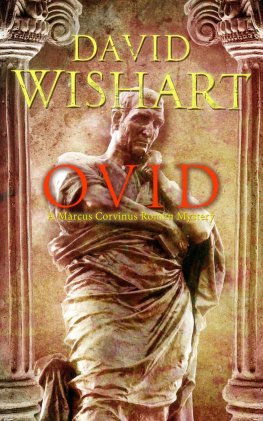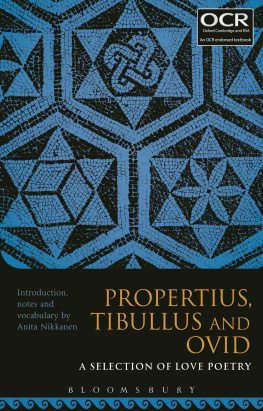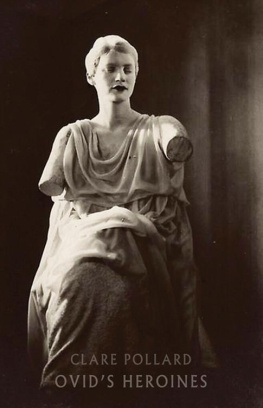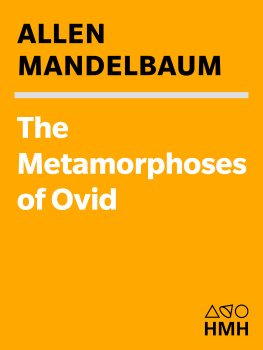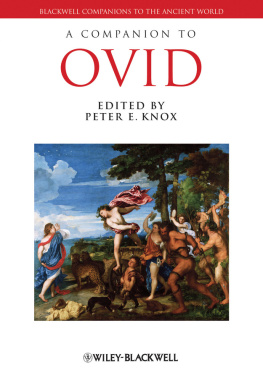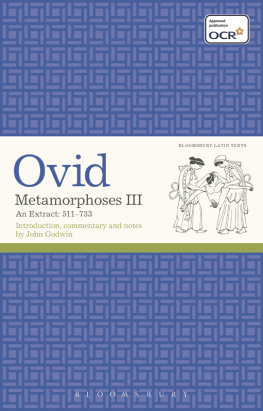
Ovid Heroides
The following titles are available from Bloomsbury for the OCR specifications in Latin and Greek for examinations from June 2021 to June 2023
Catullus: A Selection of Poems, with introduction, commentary notes and vocabulary by John Godwin
CiceroPro Cluentio: A Selection, with introduction, commentary notes and vocabulary by Matthew Barr
LivyHistory of RomeI: A Selection, with introduction, commentary notes and vocabulary by John Storey
OvidHeroides: A Selection, with introduction, commentary notes and vocabulary by Christina Tsaknaki
TacitusAnnalsIV: A Selection, with introduction, commentary notes and vocabulary by Robert Cromarty
VirgilAeneidXII: A Selection, with introduction, commentary notes and vocabulary by James Burbidge
OCR Anthology for Classical Greek AS and A Level, covering the prescribed texts by Aristophanes, Homer, Plato, Plutarch, Sophocles and Thucydides, with introduction, commentary notes and vocabulary by Simon Allcock, Sam Baddeley, John Claughton, Alastair Harden, Sarah Harden, Carl Hope and Jo Lashley
Supplementary resources for these volumes can be found at www.bloomsbury.com/OCR-editions-2021-2023
Please type the URL into your web browser and follow the instructions to access the Companion Website. If you experience any problems, please contact Bloomsbury at academicwebsite@bloomsbury.com
Contents
The teaching content of this resource is endorsed by OCR for use with specification A Level Latin (H443). In order to gain OCR endorsement, this resource has been reviewed against OCRs endorsement criteria.
This resource was designed using the most up to date information from the specification. Specifications are updated over time which means there may be contradictions between the resource and the specification, therefore please use the information on the latest specification and Sample Assessment Materials at all times when ensuring students are fully prepared for their assessments.
Any references to assessment and/or assessment preparation are the publishers interpretation of the specification requirements and are not endorsed by OCR. OCR recommends that teachers consider using a range of teaching and learning resources in preparing learners for assessment, based on their own professional judgement for their students needs. OCR has not paid for the production of this resource, nor does OCR receive any royalties from its sale. For more information about the endorsement process, please visit the OCR website, www.ocr.org.uk.
Preface
This edition is designed to assist students who are studying this selection of Ovids Heroides for OCRs A-level Latin examination in 2022 and 2023, but it is also aimed at any student who has studied Latin up to GCSE level and would like to read a selection of this text in the original.
The vocabulary list glosses every word in the text, in order to enable students to enjoy the poems without having to resort to additional dictionaries. The introduction assumes that the readers may be new to Ovid, and so it offers a section on this poets life and poetic career, before moving on to discuss the specific collection of the Heroides as a whole, with sections particularly on the OCR set texts. It is hoped that the introduction will give the students a sense of Ovids playful poetic character and that it will enthuse them to go on to explore more of his writings. The commentary itself is greatly indebted to Peter Knoxs own commentary on a selection of the Heroides. It is aimed at helping students uncover the meaning of these lines, offering grammar notes when a particularly challenging construction is used, suggestions on how to translate the more complicated sections, as well as discussions of style. Perhaps the main focus is to elucidate the interplay between these texts and their epic predecessors, the Iliad and the Aeneid.
I would like to thank all those students of mine who have enjoyed reading Ovid with me. Teaching them has been and continues to be an immense source of enjoyment and it is with them in mind that I wrote this book. Special mention goes to Tom and Rodi, who read parts of the text with me and whose questions and observations guided me when writing the commentary; to Roseannah, whose love for Ovid is only second to mine and who gladly offered her feedback to the introduction of this section; and to Lucy, whose passion for Classics is truly a pleasure to witness and foster.
Thank you also to Alice Wright and the editorial team at Bloomsbury, as well as the reviewers, whose insightful comments helped me complete this commentary.
Lastly, this book is dedicated to the students of Brentwood Schools Ovid Reading Club, who enjoyed reading the Heroides just as much as I do.
Christina Tsaknaki
July 2019
Introduction
Life and work
The Roman rhetorician Quintilian, born approximately 20 years after Ovids death, tells us that Ovid was a poet who was too in love with his own talent (Ovidius nimium amator ingenii sui, Inst. X.1.88). It is, therefore, not a surprise that our main source of information about Ovids life is none other than Ovid himself, who even composed a lengthy elegiac poem about his own life, to ensure as he tells us that posterity will know exactly who he was (Tristia IV.10.12 ille ego qui fuerim, tenerorum lusor amorum | quem legis, ut noris, accipe posteritas posterity, accept this, so that you may know who I was, I that playful poet of tender loves, whom you are reading).
Publius Ovidius Naso was born on 20 March 43 BC in a small town called Sulmo (modern Sulmona), not far from Rome. The time of his birth and early childhood was marked by great political change. A year before his birth, Julius Caesar had been murdered, initiating a period of 12 years of uncertainty until Caesars adopted son, Octavian (the soon to be emperor Augustus), defeated his political rival Mark Antony in the battle of Actium (31 BC ). The years that followed brought peace to Rome after decades of civil war but also put an end to the Roman Republic, which was now replaced by an Empire and the gradual accumulation of power to one man, the emperor Augustus. Although Ovid initially benefited from Augustus famous pax Romana, which allowed him to focus on his poetry undisturbed by political upheavals, Augustus increasing power and growing intolerance towards dissident voices would eventually cost him greatly, leading to his exile from Rome.
He belonged to an old equestrian family and had a brother who was exactly one year older than him but who died shortly after turning 20. He was clearly wealthy, as he received a distinguished education in oratory. However, he found his true calling in poetry, much to the dismay of his father, who would often try to deter him from poetry by warning him that even the great poet Homer died in poverty. Ovid playfully tells us that, being a dutiful son, he would force himself to write in prose but words in perfect metre would come out instead. Despite this humorous declaration, Ovid did begin an official career, holding a few administrative and judicial posts, but, before he could proceed further into the




